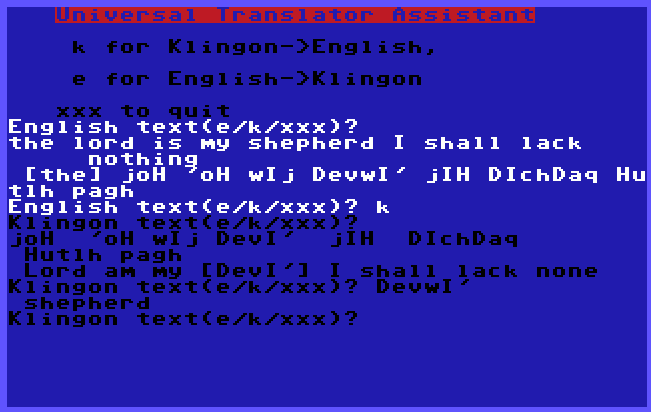
My Commodore 64 Speaks Klingon - and yours can too!
These three programs are provided as part of the Universal Translator Assistant Project and are written in compiled CBM Basic. To download them, click on the screen shot and you will get the uuencoded text of the program.
uta - provides primitive "translating" of English <--> Klingon. Really doing a relexification between two vocabularies
kahless - provides vocabularly look up from the Klingon words in Michael Jan Friedman's book "Kahless".
nlex - vocabulary lookup. A subset of words from the Klingon dictionary and afix charts (noun and verb suffixes, and verb prefixes).
Here's more about the UTA program - what it is and how to use it
(adapted from the web page info at http://members.aol.com/JPKlingon/uta):
____________________________________________________________________________
* How do I use UTA?
Simply run it and it will allow you to type English words and phrases
- when you press enter it will print
every word in that it has mapped to Klingon. Unmapped words
are printed with brackets.
To re-translate (from Klingon back to English) type "k" and press enter.
To translate from English again type "e" and press enter.
To quit type "xxx".
* Theory Behind the UTA
Not much. Call it a science fair project gone awry.
Used as a lookup tool, it lets you layout vocabulary words for an aid in
translating a text. As a translator, it demonstrates the weakness of machine
translation of natural language texts.
I recently acquired a machine-readable copy of the WEB Bible translation
(http://www.ebible.org/bible/WEB/webfaq.htm ) and was doing a number of text
processing things with it.( if you'd like to use the WEB Bible
ftp://members.aol.com/JPKlingon/scroll.zip is a simple program I wrote to
look at it, on Windows machines.) Along the way I realized it was easy to create
a list of all the unique words in a passage. From there I wondered "what would
happen if I took such a list, say from Isaiah 1, and (free of context) mapped
each word (that I could) to a Klingon word. With such a mapping, I could quickly
lay out the words in a verse, and reshape them into a grammatical Klingon
translation.
Here is a simple diagram of the process:
There are three steps to programming UTA
1. Choose a source language text to use.
2 Reduce it to a list of all unique words.
3. Translate each word into the target language to have a word-for-word mapping
Then it can be used to (badly) translate between the two languages, after a
fashion.
What was particularly interesting was the result of using this to 'translate' a
phrase into Klingon, and then back to English. While it (of course) renders an
atrocious meaningless Klingon phrase. I found that the back-translation resembled
the broken English of a person learning English as a second language. While of
limited practical use, it demonstrated to me that I was indeed modeling one form
of language mapping that occurs among humans.
____________________________________________________________________________
* How can I use UTA to translate English into Klingon
You can't. Don't try. What UTA produces is coded English - treating the target
language as a code of English. This IS a way that natural languages get used (or
abused) by non-native speakers of a language - but it is decidely NOT a
translation into the target language.
For real information regarding the Klingon languages refer to the excellent
materials from Marc Okrand (The Klingon Dictionary, The Klingon Way, and Klingon
for the Galactic Traveler) and visit the web sites of:
* the Klingon Language Institute at http://www.kli.org or
* The Interstellar Language School at
http://www.geocities.com/Athens/8853/index.html.
* Pocket Books at http://www.simonsays.com/startrek
Let me note here that the vocabulary I provide is a highly dubious one - I really
forced some words in order to come up with a Klingon word to match English
words.
____________________________________________________________________________
What is wrong with this?
The UTA program does not - CANNOT translate. All it does is map words from one
language to another. Early in the history of MT (machine translations) this idea
was easily disproved. Here is an experiment - use UTA to "translate"
I do not like you
into Klingon. You will get:
jIH ta' ghobe' rur SoH
That seems great, and it almost translates back exactly. Translate it back and
you get "I do neither like you".
No one of the translation words is wrong:
* jIH = I, I am
* ta' = do, accomplish
* ghobe' = no, not
* rur = resemble, be like
* SoH = you, you are
But it doesn't fit together at all as grammatical Klingon. Besides the meaning
for "like" UTA has is "resemble", not the sense of affection or friendship.
The best this could mean in tlhIngan Hol is
"He accomplishes I. You resemble no."
More likely it would be seen as what it is: NONSENSE. True Klingon for "I do not
like you" is far simpler:
qapar : qa- (I-you) par (dislike)
Grammar *really* does matter. UTA can be a good program, for amusement, or
automated word lookup. NOT translations.
READY.
The Languages of the Stars: Constructed Languages in Fact, and Science Fiction
Joel
Anderson